Don met Lone, the only other member of the group, besides me, who didn’t play. Lone was sixteen, tall and coltish and very beautiful. On a blustery night they knocked on my door and came in, all full of the wind that had whirled columns of dead leaves up in the air. They were obviously in love, in the first intoxication of each other.
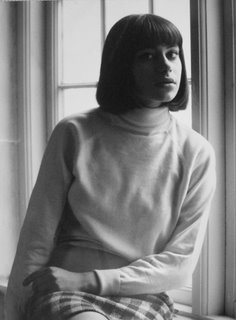 The next year was the apex of my midlife crisis. I had sold practically everything and was staying with some friends in the countryside. Don and Lone came visiting and we went for a walk. At a particular place at the edge of the forest there was a wide view over a field with grazing cows. Don took out his trumpet and started playing with a lyrical feeling that surpassed anything I had heard before. The cows lifted their heads; then they all approached and stopped in a half circle in front of us, obviously enchanted by the music. It was a magical moment!
The next year was the apex of my midlife crisis. I had sold practically everything and was staying with some friends in the countryside. Don and Lone came visiting and we went for a walk. At a particular place at the edge of the forest there was a wide view over a field with grazing cows. Don took out his trumpet and started playing with a lyrical feeling that surpassed anything I had heard before. The cows lifted their heads; then they all approached and stopped in a half circle in front of us, obviously enchanted by the music. It was a magical moment! I was going to Morocco and Don wanted to go with me. Lone went to France before Don and I left. We met her in Paris and she wanted to come with us, but Don didn’t want her to come. He was trying to get off junk and, whatever his reasons, he had a way of imposing his will. I also wanted to do this trip alone with Don and, besides, the car, a Citroën 2CV camionette, was awkward for transporting more than two people. So, after a week in Paris, we left Lone. It hurt her more than I realized and she bore a grudge against me for a long time.
I wanted to bring Don to Jajouka, the enchanted village where the worship of the Roman god Pan is still enacted every year as a mask dance where the goat-god visits the village while the Master Musicians Of Jajouka play pan flutes and small dununs. I had been there two years earlier with the help of the Moroccan artist Hamri, a friend of the beat poet Brion Gysin. Now I found my way by my self. At first the villagers were hostile; they didn’t remember me and took Don for a Moroccan. After some attempts at explanation, Hamri’s brother arrived; he recognized me but was still suspicious about Don. It was not until Don brought out his trumpet that they would believe that he was American. Now the atmosphere changed into friendliness and in the evening all the musicians gathered in the big room and played their flutes for us, and Don played with them.
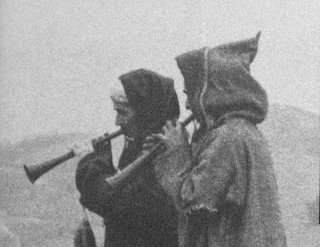 As soon as we left Jajouka Don had the urge to go home and I was alone, sooner than I had expected.
As soon as we left Jajouka Don had the urge to go home and I was alone, sooner than I had expected. I only saw Don once during the next ten years. He played at Montmartre in 1971 and presented his newborn son to the audience.
Then in 1974, when His Holiness the Dalai Lama first visited Denmark, I met Don with his wife Moki and their children Neneh and Eagle Eye. We found out that we lived not too far from each other in Sweden. In the house where I lived, in Älmeboda, the communal life was deteriorating and Don said, come and stay with us.
I moved in at Tågarp School, into two small rooms over the entrance. One was my bedroom-workroom, the other my meditation room where Don joined me every day for a homemade puja with incense, bell ringing, Tibetan song and a short meditation. Downstairs was the teacher’s apartment and two large schoolrooms. One was the music room; the other was Moki’s domain where she worked on big banners among heaps of exotic fabric. Her banners were hanging in all the rooms and they were also used as background for Don’s performances and workshops.
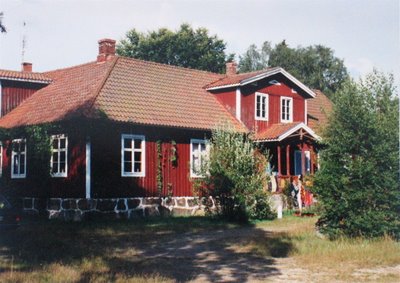
Here was the atmosphere of creativity that I had missed in the commune in Älmeboda. Don had been to India and had learnt something about ragas. He had brought home a tanpura and I had the dilrupa (see photo) that Torben Huss* had given me. Don would try out ragas on the French horn or he would combine the Indian sounds with the doussin gouni, the hunter’s guitar from Africa. I had my first experience with African rhythm when Bengt Berger came fresh from Africa and had us play a rhythm he had learnt.

Don was into working with the family and I was now part of the family. We did a tour of northern Sweden with Brazilian percussionist Nana Vasconcelos and we went to Paris, Don and Moki, Neneh, Eagle Eye and I, and did musical workshops with kids. At night Don would read a good night story to four years old Eagle Eye: a chapter from Zen master Huang Po’s life and teachings!
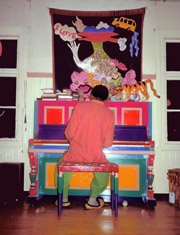
Lone was still part of Don’s life. Whenever he passed Copenhagen, he stayed with her, and in 1972 they had a son Christian. Nobody wanted to be bearer of these tidings to Moki, so she was the only person who didn’t know.
Lone came to the area near Tågarp while Don and Moki were away and I invited her and Christian over for dinner. It got late and I offered them to stay over. Then came a Surprise! Early in the morning Don called from the airport and asked me to pick them up. Lone quickly packed her things so I could drop her off on the way.
If this were a movie the camera would now focus on a stuffed bear lying forgotten on the floor. It was the first thing to catch Moki’s eye when she came home, and the whole story came out. It really shook everybody up. Don said he didn’t want our friendship to be damaged by it, but he thought it was best if I went away for a while.
I went on a tour of Buddhist centers paying my way by painting thankas and ending up at Plaige in France in Kalu Rimpoche’s center. A year and a half later I went back to Tågarp to take care of the place during the summer while Don and Moki were away. After that I had decided to go back to India, but Don said, you must see New York City. - OK, I thought, why not go the other way round to India?
I never got further than Santa Cruz, California. Here I saw Don twice when he came to play at The Kuumbwa Jazz Center. First time he was with Codona, a trio with Collin Walcott and Nana Vasconcelos who played an interesting fusion between jazz and folk music with sitar, tablas, doussi n’gouni, berimbau, etc. The second time he was with Dewey Redman, Charlie Haden and Ed Blackwell, back in the groove of modern jazz and, I am afraid, also of heroin. A third concert was announced in 1995, but it was cancelled due to sickness. My intuition told me that it was Don who was sick and so it was. Next thing I heard, he had been taken to his daughter in Spain where he died on Oct. 19th nearly 59 years old.
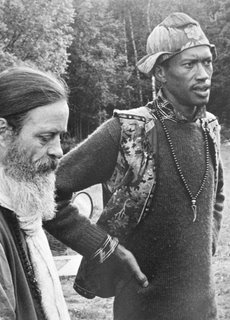 Don was a musician’s musician. He was always experimenting and was among the pioneers of modern jazz and fusion with world music. He was torn between the environment of New York where jazz and hard drugs were too often associated and the creative hippie environment that in some ways suited his spirit better, but where money were scant.
Don was a musician’s musician. He was always experimenting and was among the pioneers of modern jazz and fusion with world music. He was torn between the environment of New York where jazz and hard drugs were too often associated and the creative hippie environment that in some ways suited his spirit better, but where money were scant. I am deeply in dept to him for his opening up for participation in the music and for his inclusive generosity.
*) Torben Huss, a Danish photographer, took the pictures of Don and me.
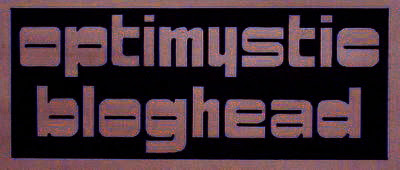
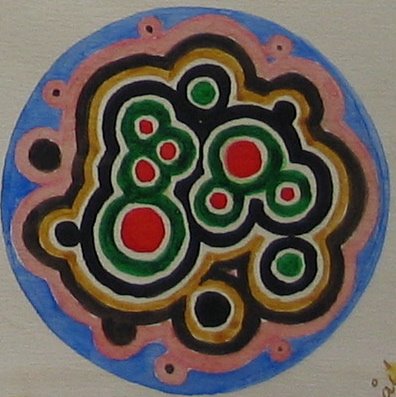

7 comments:
great stories and photos. I have been enjoying your blog, love the art and your life is quite a rave. Looks like it is great fun to do.
Love barbara
Really enjoyed your story. I just saw the school house in Tågarp today, I'm from Australia but am now living in Bjärnum. Love your artwork too!
/Steve
Thank you, Steve.
I hadn't seen Tågarp many years until I was in the vicinity last year as told here
Try again:
here
Sorry, it doesn't work.
But it was from August 13, 2006 if you care to read it.
Hi,
Interesting read. We actually met at Tågarp, I'm actually the guy "fresh from africa" teaching the rhythm and I'm not Karl but Bengt Berger, beche who was also playing the tabla and traps with Don a lot. I remember you very well, staying in the small rooms upstairs working on you thankas. Was it not you who did the "stupa" with stones on the yard?
Interesting to read your writings.
Take care
beche
Yes, beche, I did the stupa and Moki's pink flamengo still stands in front of it.
Sorry I got your name wrong, I have fixed it!
You were my first contact with African drumming and I remember the bell part you taught me.
xx x xx x x!
Post a Comment